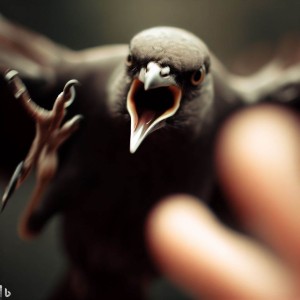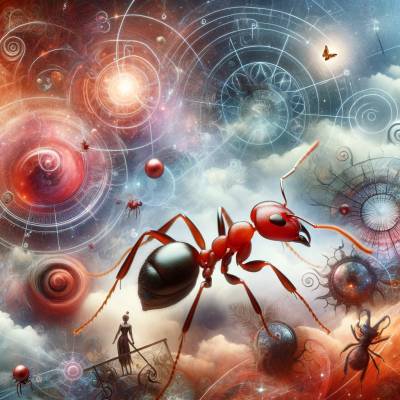The Secret Language of Sleep: Interpreting the Meaning Behind Friendly Dog Dreams

Dreams about dogs often emerge from our subconscious, reflecting our emotions, relationships, and desires. When these canine companions appear in a friendly guise, they may symbolize loyalty, protection, and unconditional love in our waking lives. Interpreting such dreams can provide insight into our personal connections and emotional well-being, offering a unique perspective on our innermost thoughts and feelings.
I. Introduction to Dream Interpretation
A. Understanding Dreams
Dreams serve as a window into the subconscious, offering insights into our desires, fears, and unresolved issues. The process of dream interpretation helps individuals decode the symbolic language of their dreams to gain a deeper understanding of themselves and their life circumstances.
B. The Significance of Animals in Dreams
Animals frequently appear in our dreams, carrying rich symbolic meanings and messages from our subconscious. These creatures can represent our instinctual nature, emotions, and personality aspects, guiding us to reflect on our behavior and relationships.
C. The Role of Emotions in Dream Analysis
Emotions play a pivotal role in dream interpretation. The feelings experienced in a dream are often a reflection of our waking life emotions, providing clues to our innermost thoughts and concerns. Analyzing these emotions can help unravel the dream’s meaning and its relevance to our personal growth.
II. The Symbolism of Dogs in Dreams
A. Dogs as Symbols of Loyalty and Protection
Dogs in dreams often symbolize loyalty, fidelity, and protection. These loyal companions can indicate a need for security or represent trustworthy relationships in the dreamer’s life. The presence of a dog may also suggest the dreamer’s protective instincts towards others.
B. The Interpretation of Dog Behavior in Dreams
The behavior of dogs in dreams can offer additional insights. A friendly dog might signify positive relationships and comfort, whereas an aggressive dog could represent unresolved conflict or fear. Interpreting these behaviors within the dream context can provide valuable perspectives on the dreamer’s emotional state.
C. The Emotional Context of Dogs in Dreams
The emotional context surrounding the appearance of dogs in dreams is crucial for interpretation. A dream involving a happy, friendly dog may reflect contentment and harmony in the dreamer’s life. In contrast, a frightened or hostile dog could point to underlying anxiety or threats to the dreamer’s sense of security.
III. Unpacking the Meaning of Friendly Dog Dreams
A. Positive Emotional States and Their Reflection in Dreams
Dreams of friendly dogs often mirror positive emotional states, such as happiness, love, and a sense of well-being. These dreams can serve as reassurance during times of stress, reminding the dreamer of the support and affection available to them.
B. Friendly Dogs as Messengers of Comfort and Security
A friendly dog in a dream can be a messenger of comfort and security, symbolizing the presence of a protective force or a loyal friend in the dreamer’s life. Such dreams encourage the dreamer to embrace their relationships and the support they offer.
C. The Connection Between Friendly Dog Dreams and Real-Life Relationships
The appearance of friendly dogs in dreams can also highlight the dreamer’s real-life relationships. These dreams may reflect strong bonds of friendship and trust or the desire for more meaningful connections with others.
IV. Variations in Friendly Dog Dream Interpretations
A. The Influence of the Dog’s Breed on Dream Meanings
The breed of the dog seen in a dream can influence its interpretation, with each breed carrying its own set of symbolic meanings. For example, a dream featuring a German Shepherd might emphasize protection, while a Labrador Retriever could symbolize friendliness and support.
B. The Impact of the Dreamer’s Personal Experiences with Dogs
A dreamer’s personal experiences with dogs can significantly affect the interpretation of their dreams. Individuals who have had positive interactions with dogs are more likely to associate these dreams with comfort and protection, whereas those with negative experiences might interpret them differently.
C. Cultural Perspectives on Dogs and Their Dream Interpretations
Cultural background plays a role in how dreams about dogs are interpreted. In some cultures, dogs are revered as spiritual guides or protectors, while in others, they may represent loyalty and domesticity. Understanding these cultural nuances can provide additional layers of meaning to dream interpretations.
V. FAQs
Q: What does a friendly dog in a dream signify?
A: A friendly dog typically represents loyalty, joy, and protection. It suggests positive relationships and comfort in your life.
Q: How do different dog breeds in dreams affect interpretation?
A: Different breeds may symbolize various aspects of your life. For instance, a guard dog breed might indicate protection, whereas a retriever could symbolize friendship and assistance.
Q: Can the color of the dog in a dream alter its meaning?
A: Yes, colors add depth to the interpretation. A black dog might represent the unknown, while a white dog could signify purity and guidance.
Q: What does it mean if the dog in your dream is speaking to you?
A: A speaking dog could symbolize your intuition or a message from your subconscious, urging you to pay attention to loyalty and trust in your waking life.
Q: How do dreams of playing with a friendly dog translate?
A: Playing with a friendly dog in a dream may reflect a need for more fun and relaxation in your life or symbolize happy, carefree moments.
Q: Is there significance to dreaming about a dog that has passed away?
A: Dreaming about a deceased dog often reflects lingering affection, memories, or unresolved grief. It can also symbolize lessons or love you received from the pet.
Q: What does dreaming about rescuing a dog signify?
A: Rescuing a dog in a dream may indicate your willingness to help others in need or reflect a part of yourself seeking rescue or attention.
Q: What does a wasp in a dream mean?
A: A wasp in a dream could signify feelings of anger, annoyance, or threat in your life. It might also point to unresolved conflict or warning signs.
Q: What does a fox in a dream mean?
A: Dreaming about a fox often symbolizes cunning, strategy, or adaptability. It suggests that you approach a situation in your life with more intelligence and discretion.
VI. Conclusion
A. The Personal Nature of Dream Interpretation
Dream interpretation is deeply personal and subjective, reflecting the dreamer’s unique emotions, experiences, and subconscious thoughts. Understanding the symbolism in dreams offers a pathway to self-discovery and emotional insight.
B. Integrating Dream Meanings into Personal Growth
Recognizing and integrating the meanings behind dreams can significantly contribute to personal growth and self-awareness. Dreams offer valuable lessons and insights, encouraging individuals to address underlying issues and enhance their emotional well-being.
C. The Limitations of Dream Analysis
While dream analysis can provide profound insights, it has its limitations. Interpretations are not one-size-fits-all, and personal biases can affect understanding. Recognizing these limitations is crucial in using dream interpretation as a tool for personal development.
VII. Suggested Readings
Exploring dream interpretation further can enrich your understanding and application of this fascinating subject. Here are several recommended books:
- “The Interpretation of Dreams” by Sigmund Freud – This classic text introduces the theory of dream analysis and Freud’s psychological theories.
- “Dreams: Unlock Inner Wisdom, Discover Meaning, and Refocus your Life” by Rosie March-Smith – Offers practical advice on interpreting dreams and using them for personal insight.
- “The Dream Interpretation Dictionary: Symbols, Signs, and Meanings” by J.M. DeBord – A comprehensive guide to dream symbols and their meanings, helping readers navigate their subconscious.
- “Dream Psychology: Psychoanalysis for Beginners” by Sigmund Freud – An accessible introduction to Freud’s theories on dreams and the unconscious mind.
- “Lucid Dreaming: Gateway to the Inner Self” by Robert Waggoner – Explores the concept of lucid dreaming and its potential for self-discovery and personal growth.
These books provide a solid foundation for anyone interested in the nuances of dream interpretation, from beginners to those seeking to deepen their knowledge. Whether you’re exploring your own dreams or the broader theories behind them, there’s much to discover in the world of dream analysis.






